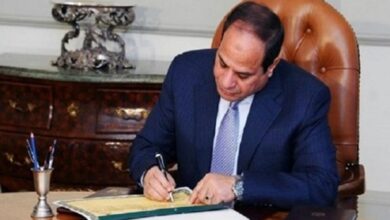The Supreme Administrative Court ruled Tuesday that Egyptians living abroad should be allowed to vote in the upcoming parliamentary elections from the headquarters of accredited Egyptian diplomatic missions, a decision that has been celebrated by Egyptian expatriates. For months this has been a major demand; and after unfulfilled promises by the state, the Union of Egyptians Abroad chief Essam Abdel Moneim led a number of expatriates in filing a case against the chairman of the High Elections Commission, the head of Supreme Council of the Armed Forces (SCAF), the prime minister and interior minister.
An Al-Ahram report starts with one sentence about the Foreign Ministry pledging to abide by the court ruling. This is presented in the context of preparations for the parliamentary elections, as the state-run paper highlights the joint efforts of the armed forces and security forces in “implementing a strict security plan across all Egyptian governorates.” No details about the implementation process are provided.
Privately owned Youm7 cites Abdel Moez Ibrahim, head of the High Elections Commission, as saying that implementing the ruling is “impossible.” The state has neither a database of Egyptians abroad, nor enough judges to oversee voting, explained Ibrahim. Counselor Adel Farghaly, former administrative court head, seems to agree. In a statement to privately owned Al-Shorouk, he said it is more realistic to expect expatriates to vote in the presidential elections. But columnist Wael Kandeel writes in Al-Shorouk that not abiding by the court ruling would cause further anxiety and dissatisfaction among Egyptians and increases the risk that election results could be appealed in court. Presidential hopeful Mohamed ElBaradei shares a similar view in a statement to Youm7. Kandeel adds that the government's willingness to comply is the main factor in whether the ruling is applied, and that he hopes state-run media will not begin its usual campaign to convince the public that this is not feasible.
With anxiety over the parliamentary elections mounting, the Muslim Brotherhood’s Freedom and Justice Party (FJP) campaign is raising concerns. Party Secretary General Saad al-Katatny said during a press conference Tuesday that his party will not use the slogan “Islam is the Solution” in its political campaign. Yet, Al-Shorouk runs images of party posters bearing that slogan, followed by a story about the beginning of the party’s campaign in Fayoum. Katatny has emphasized that the party is not responsible for the slogans of people running as independents, writes Al-Shorouk. And in a statement to Youm7, Freedom and Justice Party legal advisor Ahmed Abu Baraka, announced on Wednesday that “Islam is the Solution” will still be used along with “We bring good to Egypt.” The former remains the primary message of the Brotherhood, said Abu Baraka, and their decision to use the other slogan now is because it best reflects the changes Egypt is undergoing.
Celebrating the victory of the moderate Islamist Ennahda (Renaissance) Party in the Tunisian elections, privately owned Al-Tahrir's editor-in-chief, Ibrahim Eissa, expresses his hopes that Egypt’s elections will be similarly fair, and says he will respect the choices of Egyptians. If the Brotherhood wins, Eissa expects them, like Ennahda, to respect human rights owing to their own experiences with state torture and detention since the time of the monarchy. He believes a Brotherhood victory could give hope to various political groups who might face difficulties during the transitional period. The main challenge currently facing the Brotherhood, though, writes Eissa, is its “dual personality,” and the contradictions between being a secretive organization and an open political party, as well as its long-standing doctrine that the “interest of the group supersedes the interest of the nation, and that the power of organization prevails over that of values.”
Al-Tahrir also celebrates on its front page the conviction of two police officers for the infamous murder of Khaled Saeed, who was beaten to death. The Alexandria Public Prosecution has also referred five police officers accused of torturing and killing Sayed Bilal for investigation. Bilal, a Salafi, died in detention after being arrested during an investigation into the New Year's Eve bombing of the Two Saints Church in Alexandria.
As low-ranking policemen across Egypt continue to strike for the fourth day, journalists and columnists express their anxiety over the protest. Privately owned Al-Dostour leads its front page with the sensational headline “The state is collapsing,” citing numerous strikes across the country by policemen, workers and doctors. Expert and former police officer Mahmoud al-Qatary, however, refused to describe the police strike as “class based,” according to Al-Dostour. “If there’s a conspiracy to delay the elections, the policemen are not part of it unless they were enticed to make their strike at this particular time,” Qatary added.
The officers began their general strike on Monday to demand the resignation of Interior Minister Mansour al-Essawy, the removal of corrupt officers affiliated with the former Mubarak regime from the ministry, an end to military trials for police, and improved pay and working conditions. Columnist Gamal al-Ghitany, however, writes in state-run Al-Akhbar that the police strike can be only described as an act of rebellion that reflects the demise of the state. Ghitany cites the 1947 strike by police officers, which he describes as a precursor of the 1952 revolution. The current strike should not be seen as a symptom of democracy, he writes, although he admits their demands are legitimate.
Egypt's papers:
Al-Ahram: Daily, state-run, largest distribution in Egypt
Al-Akhbar: Daily, state-run, second to Al-Ahram in institutional size
Al-Gomhurriya: Daily, state-run
Rose al-Youssef: Daily, state-run
Al-Dostour: Daily, privately owned
Al-Shorouk: Daily, privately owned
Al-Wafd: Daily, published by the liberal Wafd Party
Youm7: Daily, privately owned
Al-Tahrir: Daily, privately owned
Sawt al-Umma: Weekly, privately owned
Al-Arabi: Weekly, published by the Nasserist Party




